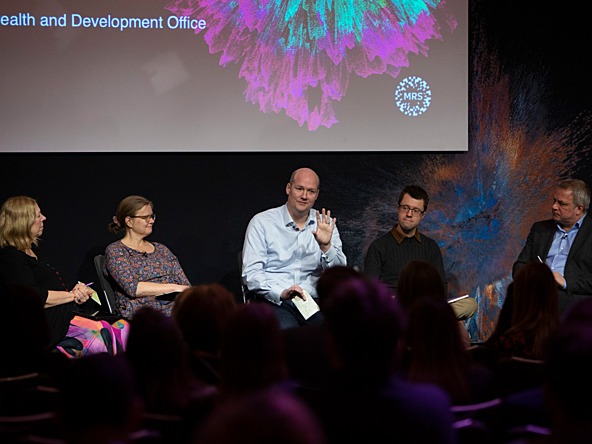How research can be indispensable to c-level leadership

Fraser Hardie, senior adviser at Teneo (pictured, right), who worked with Tesco when chief executive Dave Lewis came in to lead turnaround efforts at the business in 2014, outlined the importance of insights teams being able to share their opinions on a view to help inform decision-making at the highest level.
“Evidence is only part of it. If you want to be listened to at the top, you have to go with evidence-based opinion. It requires a degree of bravery to do that. You need to routinely be braver and when you do, you give people choices,” said Hardie.
“It’s not your decision to make, so why are you afraid of giving an opinion? Give your opinion and the evidence to support your opinion. CEOs can't predict the future and neither can you, but you can help to navigate the way.”
Moderating the discussion, Viki Cooke (pictured, left), chair at Thinks Insight & Strategy (formerly BritainThinks), asked how the research industry to foster that and encourage researchers to formulate opinions when presenting to senior leaders. “How can we help people get to a place where they have that credibility?”, she asked.
James Sallows, global head of transformation & capability, consumer & business insights and analytics at Haleon (pictured, centre), said: “We can’t just expect insights people to be comfortable giving opinions without investing in those skills. Building the credibility of the function and empowering people and giving them the chance to practise those skills, is key. Insight impact, for me, is the key piece – that needs to be as much of a focus to drive change as the consumer focus.”
Haleon’s insight team set an “aggressive” aim of how it wanted to be seen internally and how it wanted to drive growth as an insight team, according to Sallows. “Our corporate website talks about human understanding. Insight is being pitched as a corporate advantage to our investors. We can do that because we have built an environment of credibility over the past three years. Human understanding is across our entire enterprise.”
Being at the top table might mean making trade-offs, said Catherine Hunt from the Commonwealth and Development Office (pictured, second from left), as she discussed her experience of producing evidence for the government during the pandemic.
Hunt said: “I look back as a civil servant and I’m really proud of how we used insight to inform everything we did in terms of comms. ‘Hands, space, face’, the press conferences, these were all genuinely insight led decisions we helped to facilitate.”
“We were pushing insight and research to deliver in ways it hadn’t done before. We were running focus groups overnight and running polls every night. Yes, there are trade offs but if you want to be at the top table, you have to be there helping the people making the decisions, right then.”
Hunt also explained how her team built “a central source of data and evidence that everyone could use that was accessible and easy” and added that there was “a realisation that research can be pragmatic, can be nimble and can evolve.”
She said: “If you want to be at the top table, sometimes it might be possible to say ‘give us three months’ and sometimes it’s about saying ‘what do you need and we’ll see what we’ve got now’.”
Stuart Bluck, head of research and insight at Cinch (pictured, second from right), shared his experience of joining Cinch and deciding, as a team, where to focus their efforts initially. “We, as insights, were the island in the storm, so we decided our focus had to be on segmentation. That created some tension and hostility because of having to wait three months, but we had to confirm that yes, this is the right thing for us.
“We are now able to prove, with hard evidence, how we can shape ROI, and that is now shaping conversations with the executive team – it was a specific decision that we made but I think will pay off for us in the long run.”
Advocacy across the business was key, added Bluck. “We had to fight our case on multiple fronts. For us, it was about building advocacy at the level below the leadership team.”
Elsewhere in the discussion, the panel took aim at the lack of definition of insight itself. Hunt said: “I think we genuinely have a problem as a profession. What is insight? It’s such a weak and pathetic word. Is insight the creative testing you’ve done? Is it econometric modelling, is it amazing ethnographic research or clever open-text analysis? All those amazing different things are brought under the word insight.
“We are researchers, modellers and data scientists – we need to be really, really clear in what we do. And it’s not a really weak noun, it should be a verb.”
Sallows said: “Is it an insight if it doesn't drive decisions? It’s only insight if it creates a business opportunity, otherwise it’s not an insight.”

We hope you enjoyed this article.
Research Live is published by MRS.
The Market Research Society (MRS) exists to promote and protect the research sector, showcasing how research delivers impact for businesses and government.
Members of MRS enjoy many benefits including tailoured policy guidance, discounts on training and conferences, and access to member-only content.
For example, there's an archive of winning case studies from over a decade of MRS Awards.
Find out more about the benefits of joining MRS here.














0 Comments